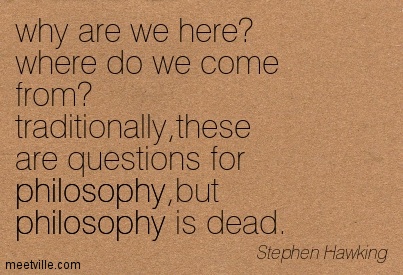Death of philosophy greatly exaggerated
 Sleep medicine categorizes different types of insomnia by the part of the sleep cycle that’s “troublesome.” For example, there’s difficulty falling asleep, difficulty staying asleep, and waking up too early. I can fall asleep in five minutes, but I wake up at four AM. I don’t consider this insomnia, but a normal expression of two-part or segmented sleep (also known as bimodal, bifurcated or divided sleep). This is the way we used to sleep before industrialization.
Sleep medicine categorizes different types of insomnia by the part of the sleep cycle that’s “troublesome.” For example, there’s difficulty falling asleep, difficulty staying asleep, and waking up too early. I can fall asleep in five minutes, but I wake up at four AM. I don’t consider this insomnia, but a normal expression of two-part or segmented sleep (also known as bimodal, bifurcated or divided sleep). This is the way we used to sleep before industrialization.
Four AM is when I listen to what used to be called “books on tape.” Recently I listened to a series of lectures by philosophy professor Lawrence Cahoone called The Modern Intellectual Tradition: From Descartes to Derrida. The presentation of this potentially difficult subject matter — Kant, Hegel, Heidegger, Wittgenstein — was excellent. Cahoone made philosophical ideas interesting and (relatively) easy to understand. The lectures kept me awake rather than putting me to sleep, and I came away thinking I’d be happy to spend the rest of my life reading nothing but philosophy.
That probably won’t happen, of course. I find it very difficult to contain my interests. For example, I really want to read about how sleep became medicalized as a social norm under capitalism. Any deviation from eight hours of continuous sleep is now labeled “troublesome” and in need of medication (on this subject, see the first four books listed below).
I do hope to read at least one of Cahoone’s books (also listed below), and this may well lead me to more of his writings. I find it hard to make as much time as I’d like for reading during the day, but easy to listen to CDs in the middle of the night. So my next encounter with Cahoone will definitely be another of his lecture series (The Modern Political Tradition: Hobbes to Habermas). The CDs are waiting for me now at the library.
Anyway, all this is simply by way of introducing an enjoyable observation on philosophy that I came across recently.
Plato at the Googleplex
This comment comes from a review of Rebecca Newberger Goldstein’s Plato at the Googleplex: (emphasis added)
One of the most raucous jeers against philosophy in general, and Socrates in particular, was delivered in Plato’s own time, by the comic playwright Aristophanes. Nowadays, it is most often scientists who lead the taunting. … They are tone-deaf to philosophical reasoning and mistakenly suppose that the defect lies in the music rather than in themselves. Such uncomprehending hostility is an intriguing phenomenon, which perhaps in part reflects the narrowness of scientific specialization these days. Einstein and several of the founders of quantum mechanics were enthusiasts for philosophy, possibly because they benefited from a broader education than today’s laboratory pundits. …
As Goldstein puts it: “If philosophy makes progress, then why doesn’t Plato at long last just go away?” … A more apt approach to the enigma of philosophical progress may be to question the question. Should we really regard philosophy as a dog-eared crossword puzzle, first published some 2,500 years ago and still pored over by enthusiasts who, after 100,000 rainy Sundays, have managed to fill in only a handful of clues? Another way to see it is as a fountain of eternally youthful questions, with which we shall always be grappling because they expose unresolvable tensions in our beliefs and concepts, and stimulate our intellectual appetites. Wouldn’t it in fact be rather disappointing to stop asking fundamental questions?
Lawrence Cahoone ends his Modern Intellectual Tradition lectures on the same note. The last lecture is called “Philosophy’s Death Greatly Exaggerated.”
It may be that we are just not built for cognitive rest. Human beings are condemned to ask questions beyond and about what they do and what they experience. So the journey of modern thought is not over; perhaps it is just beginning.
Think I’ll sleep on that.
Related posts:
Philosophers ask: What do we mean by “self”
The philosophical value of a no-self perspective
Would we be better off if we took ourselves less seriously as selves?
Is a liberal arts education good preparation for being a doctor?
The physician as humanist
The physician as poet
The physician as reader of poetry
Image source: meetville
Resources:
Matthew J. Wolf-Meyer (2012), The Slumbering Masses: Sleep, Medicine, and Modern American Life
Simon J Williams (2011), The Politics of Sleep: Governing (un)consciousness in the late modern age
Simon J Williams (2005), Sleep and society: Sociological Ventures into the (Un)known
A. Roger Ekirch (2006), At Day’s Close: Night in Times Past
Lawrence Cahoone (2006), The Modern Intellectual Tradition: From Descartes to Derrida (available on CD, DVD, and (from Amazon) as audio streaming)
Lawrence Cahoone (2014), The Modern Political Tradition: Hobbes to Habermas (available as CD, DVD, and (from Amazon) as audio streaming)
Anthony Gottlieb, Let’s Have a Dialogue, The New York Times Book Review, April 18, 2014
Rebecca Newberger Goldstein (2014), Plato at the Googleplex: Why Philosophy Won’t Go Away
Lawrence Cahoone (2013), The Orders of Nature
Lawrence Cahoone (2006), Cultural Revolutions: Reason Versus Culture in Philosophy, Politics, and Jihad
Lawrence Cahoone (2003, editor), From Modernism to Postmodernism: An Anthology Expanded
Lawrence Cahoone (1995), The Ends of Philosophy
Lawrence Cahoone (1988), The Dilemma of Modernity: Philosophy, Culture, and Anti-Culture

Sorry, comments are closed for this post.